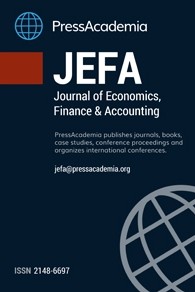IDENTIFICATION OF KEY PERFORMANCE INDICATORS OF AUDITOR’S REPORTS: EVIDENCE FROM BORSA ISTANBUL (BIST)
Purpose- This paper investigates the key performance indicator variables that predict auditors' decisions to issue unqualified or modified (a qualified opinion, adverse opinion, and a disclaimer of opinion) audit reports for nonfinancial companies listed in Borsa Istanbul for the year 2016.Methodology- Logistic Regression Model is developed to determine the key performance indicators of the qualification of the auditors’ reports and the predictive accuracy of the estimated model is evaluated.Findings- Results of the analysis show that the qualification of an audit report is mainly associated with return on asset, return on equity, times interest earned ratio and whether the audit firm is classified as BIG 4 or not. The estimated model distinguishes between unqualified and other opinions for nonfinancial companies with a 92.4 % classification accuracy. Conclusion- Although the overall accuracy of the logistic regression model is very high, regarding the population characteristics there is an increased risk that the study results might be biased. The fact that the study is done for a single period and the number of companies (240 out of 263) which have unqualified audit opinions is very high might lead the results to be biased. This result also leads to a conclusion that other issues rather than the deterioration in financial ratios might induce the companies to have an audit report other than unqualified.
Keywords:
Audit report, key performance indicators, Borsa Istanbul (BIST) Turkey, logistic regression,
___
- Arens, A. A., Elder, R. J., & Mark, B. (2012). Auditing and assurance services: an integrated approach. Boston: Prentice Hall.
- Bell, T. B., & Tabor, R. H. (1991). “Empirical analysis of audit uncertainty qualifications”, Journal of Accounting Research, 29, p.350–370.
- Caramanis, C., Spathis, C., (2006) "Auditee and audit firm characteristics as determinants of audit qualifications: Evidence from the Athens Stock Exchange", Managerial Auditing Journal, Vol. 21 Issue: 9, p.905-920
- Chen, K., Church, B. (1992), “Default on debt obligations and the issuance of going concern opinions”, Auditing: A Journal of Practice and Theory, p. 30-49, Fall.
- Dopouch, N., Holthausen, R. and Leftwich, R. (1987), “Predicting audit qualifications with financial and market variables”, The Accounting Review, Vol. 62 No. 3, p. 431-54.
- Gaganis, C., Pasiouras, F., & Doumpos, M. (2007). “Probabilistic neural networks for the identification of qualified audit opinions”, Expert Systems with Applications, 32, p.114–124.
- International Standards on Auditing (IAS) 700 –Forming an Opinion and Reporting on Financial Statements International Standard on Auditing (ISA) 705 Modifications To The Opinion In The Independent Auditor’s Report
- Keasey, K., Watson, R. and Wynarzcyk, P. (1988), “The small company audit qualification: a preliminary investigation”, Accounting & Business Research, Vol. 18 No. 72, p. 323-33.
- Laitinen, E. K., &Laitinen, T. (1998). “Qualified audit reports in Finland: Evidence from large companies”. European Accounting Review, 7, p. 639–653.
- Spathis, C. (2003), “Audit qualification, firm litigation, and financial information: an empirical analysis in Greece”, International Journal of Auditing, Vol. 7 No. 1, p. 71-85.
- Zdolšek, D., Jagrič, T., MarjanOdar,M.,(2015). "Identification of auditor’s report qualifications: an empirical analysis for Slovenia", Ekonomskaistraživanja 28.1, p. 994-1005.
- Yayın Aralığı: Yılda 4 Sayı
- Başlangıç: 2014
- Yayıncı: PressAcademia
Sayıdaki Diğer Makaleler
İlhan GULLU, Nazife Ozge KİLİC, Omer SANLİOGLU
Huseyin INCE, Fatma SONMEZ CAKİR
Yuksel ILTAS, Halil ARSLAN, Temur KAYHAN
Oktay TAS, Huseyin MERT, Remzi AYDİN
İsmail ATABAY, Fatih KOC, Mustafa Melkin ODER, Bayram ALAMUR
